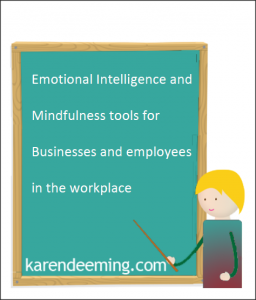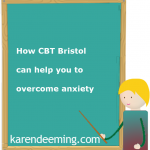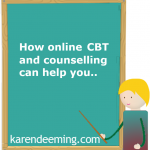
In response to Coronavirus (Covid-19), I am offering telephone, online counselling and CBT sessions via Zoom and WhatsApp.
New Mindset new work opportunities…
Does any of this sound like you?
- I want to reconnect with my creativity, spark and imagination but don’t know how
- Instead of feeling demotivated and bored at times, I want to feel more focused, passionate and enthusiastic about my work
- I’d like to achieve even greater success levels in work and relationships
- I want to become more productive, to procrastinate less, to make smarter use of my time and to consistently meet/exceed my targets
- Making it to the top of my career is a key priority for me
- I’d like to enhance my leadership skills, to improve my communication style, to read people more efficiently and to become more emotionally intelligent
- Obstacles keep holding me back because I’m afraid of not having what it takes to be successful or to follow my ideal career path
- I’d like to be more decisive
Well the good news is you are not alone in this, we all feel at least one of these things sometimes…
Even more good news, Mindfulness and emotional intelligence strategies and tools can really help you to overcome stress, burn out and to develop new/improved business skills too such as –
- Improved work performance and targets
- Wiser Decision making
- Resilience
- Patience
- Mental Focus
- Improved People and Social skills
- Creativity
- Skilful Communication
- Embodied Leadership
- Confidence
- Empathy and compassion
- General well-being
- Ability to perform better under pressure
Bringing Mindfulness and Emotional Intelligence to the Workplace
Google is, by all accounts (it was named Fortune’s top great place to work in 2014), a world-class employer. The organisation prides itself on being socially conscious, offering employees (known as Googlers) substantial benefits and perks like on-site cafes, dry cleaners, nap pods, and more than a dozen mindfulness courses. Google’s most popular “Search Inside Yourself” mindfulness course, offered since 2007, has a six-month wait list and thousands of Googler alumni.
The program consists of 19 sessions or an intensive two-and-a-half day retreat, and is designed as a contemplative training program that helps participants learn to better relate to themselves and to others. The training consists of three parts: attention training, self-knowledge development, and “creating mental habits.” Attention training focuses on developing the ability to bring one’s mind, under any circumstance and at any time, to a place that is calm and clear. Self-knowledge development focuses on becoming more aware of one’s self, creating a quality of self-knowledge and self-awareness that improves over time.
This self-awareness helps mindfulness practitioners master their emotions. The third part of the training focuses on creating mental habits – for example, creating a mental habit of kindness. Participants are taught to look at every person they encounter and think “I want this person to be happy.” Once it becomes a mental habit, kindness comes naturally (Baer, 2014).
Google says this and other mindfulness programs are good for the company because they teach emotional intelligence, which helps people better understand their colleagues’ motivations. It also boosts resilience to stress and improves mental focus (Baer, n.d.). Participants of the “Search Inside Yourself” program agree. They report being calmer, more patient, and better able to listen. They also say the program helped them better handle stress and defuse emotions (Kelly 2012).
Healthcare giant Aetna liked the outcome of their study on mindfulness so much they now offer their mindfulness programs to customers, and more than 3,500 employees have participated in the programs.
In 2010, Aetna developed, launched, and studied two mindfulness programs—Viniyoga Stress Reduction and Mindfulness at Work—in collaboration with Duke University, eMindful, and the American Viniyoga Institute.
The goals of the programs were to help reduce stress and to improve how participants react to stress (Gelles, 2012 and Aetna staff, 2012).
In today’s work environment, mindfulness and emotional intelligence are personal and professional strategies to improve performance and productivity.
As Google, Aetna, General Mills, and Target can attest, bringing mindfulness and emotional intelligence to their workplaces has decreased employees’ stress levels, improved their focus and clarity, improved their listening , decision-making and leadership skills, and improved their overall happiness and well-being.
Perhaps most importantly from an HR and talent management professional perspective, mindfulness can reduce employee absenteeism and turnover, improve employee and client relationships, and boost job satisfaction.
So, what’s the cost of leading a hectic lifestyle to our health and well-being without mindfulness and emotional intelligence strategies?
It can be exciting and thrilling pushing ourselves to and often beyond the limits of how much we are capable of. That said, doing too much too quickly can be exhausting, uncalled for, and potentially dangerous, for example, phone calls whilst driving.
In our relentless overloaded world, we often feel depleted and more tired when we get up in the morning than when we go to bed. Our productivity levels and the quality of our work depreciates with speed. The quicker we approach tasks the more likely we are inclined to make errors. When we feel up and high, we ride our hectic life like a high performing surfer in the flow of a great wave, but when we’re down often we wipe out, burn ourselves out and can’t seem to overcome exhaustion. Most importantly though this has long lasting and detrimental consequences for our health and well being such as high blood pressure, fragile immune systems and chronic fatigue syndrome.
What can you do about it?
Over the next few weeks, I’ll be sharing with you the mindfulness, emotional intelligence self help and personal development techniques and tools that helped me to:
- fulfil my dream of escaping the corporate cage, that is, my well-paid secure job and hectic lifestyle in London
- move from London to live in the idylic countryside and do my dream job as a successful Psychotherapist, Coach and Mindfulness Teacher helping 1000s of clients at my Liverpool Street and Harley Street Practices and nowadays at my online, Bristol and Somerset Practices sometimes advising film Directors, such as Mike Leigh, on the authenticity of film narratives.
Though I am now doing my dream job, living in a delightful Somerset village and have many tools at my disposal, life is occasionally still tough so I’ll also send you some tips to help you remain motivated, and focused when you are feeling stuck, overwhelmed, lost or you are falling victim to ”l’m too busy and don’t have enough time” and procrastination trap.
Tip One: How mindfulness and emotional intelligence can help you to achieve more focus at work
Walk away from your desk and imagine you are pressing the pause button of a film entitled: “My work life”
Then, physically step to the right and ask yourself the following questions:
Why am I feeling unfocused and distracted?
Is it because:
It is Monday morning and you are still slightly hungover from too many glasses of prosecco at the weekend?
You feel too overwhelmed to begin any work tasks because there are simply too many competing deadlines and you don’t know where to start?
Your workspace is untidy with a mountain of paperwork?
Your mind keeps jumping from one thought to another?
You often find yourself falling victim to the procrastination trap, because you cannot focus for long, and then abandon or postpone what you are doing?
You seem to get sucked into checking blogs, facebook, instagram, texting friends, thinking about coffee breaks, etc?
You are bored and don’t feel challenged?
You are stuck doing repetitive tasks, your goals are not motivating, or you have lost interest in your work?
You are stressed, frazzled, overloaded, and exhausted. There is too much pressure, you are involved with too many projects, and feel very busy in many areas of your life?
When you’re doing something and something else comes along to demand your attention, you need to essentially reactivate your brain to switch between neural networks,” says Adam Gazzaley, director of the Neuroscience Imaging Laboratory at the University of California, San Francisco. “And that switching results in a cost to performance.”
“We don’t have a good record of distributing or dividing our attention,” Gazzaley says. “If your goal is high-level performance, you should be aware that moving between high-level activities is detrimental.”
Achieving motivation and focus isn’t easy in today’s stressful, pressured work places even those where there are meaningful objectives and targets.
Well here’s some good news: your own level of motivation is in your control, and you have the power to change it.
Procrastination and difficulty focusing are life long friends for me and even something, dare I say it, struggled with whilst writing this blog!! I’d even go as far to say that this is the most difficult blog I have written so far because of the constant flow of distractions and competing deadlines this week. You know the pressures.
As a high flying journalist writing about Ruby Wax puts it:
“For goodness sake, get a grip, woman. Don’t you know how lucky you are? You have zero right to be unhappy. Thousands are being murdered in Syria and you can’t even get out of bed, you self-indulgent cow. What happened to that fitness regime you promised you’d start, eh? No self-control, that’s your problem. And you haven’t replied to Jane’s texts. Jane must think you’re a crap friend. And she’s right. It’s a miracle you’ve got any friends left. Get up! You’ve got a to-do list which stretches from here to Loch Lomond. Pack the boy’s bag for camp, check Twitter. The plants on the patio are dying in their polystyrene coffins because you haven’t had time to put them in pots. Poor plants must hate you. Better check those watched eBay items. You don’t want to miss out on that incredible vintage (aka old, smelly and broken) deckchair, which is going to transform your life and usher in a new era of relaxation. Oh, dear God. I’m supposed to have handed in my review of Ruby Wax’s book to the paper. Gah! What are you going to tell them, eh? ‘Sorry, I was too stressed out to review the book about anxiety and stress?’”
So how can mindfulness and emotional intelligence help you to achieve more focus at work?
1 Develop patience
There will sometimes be days when you just can’t get it together. When that happens, be patient and wait for the mood to pass. Bear in mind that our emotional states are the on off switch for peak performance and our capacity for new learning. What helps me when this happens is reminding myself that I can’t change my thoughts, feelings and physical sensations but I do have the power to change what happens next. For example, instead of catastrophising and letting my thoughts spiral out of control I can step aside and recall my CBT and mindfulness teachers saying:
“thoughts aren’t facts they are just our perception of the world based on past experiences, and, you have a choice to not to engage with them”.
As Dr Edward Hallowell articulates in his book: driven to distraction at work: how to focus and become more productive:
“The better you understand yourself, your personal psychology, and your emotional hot buttons, the better able you will be to hold yourself in the right emotional state for focus, while steering clear of the negative states that render sharp focus impossible. Positive emotion, in turn, galvanizes engagement”.
Frequent multitasking can lead to what Hallowell calls attention deficit trait, a high-anxiety response to the hyperconnected environment in which we live and work – in other words, brain overload. Core symptoms include distractibility, inner frenzy, and impatience.
“When people experience ADT, they have difficulty staying organized, setting priorities, managing time, and may even feel a constant pressure or anxiety,” he says.
2 Invest your energy wisely
Remember your brain has difficulty focusing without energy, and lots of it. As your supply of energy gets low, you start to fade. Taking steps to monitor your brain’s energy supply is as basic and crucial as keeping your petrol tank full. Most people ignore or take for granted this fundamental necessity, as if the supply was infinite, and they do not monitor carefully how they spend their energy, thus wasting great quantities of it on trivial tasks.
When you invest your energy wisely and see to it that energy tank is always full, you become able to feel positive emotion and thus remain more focused.
3. Get organised
With a continual flow of distractions, constant interruptions, various social media and mobile phone tones chiming around you, creating structure at the beginning of your working day is paramount. By this I mean: how do you shape your day, how do you spend your time, what boundaries do you create, what rules do you follow, how do you delegate, how efficient are your current filing systems, how do you define priorities and filter out tasks, do your plans have any flexibility. In the absence of structure, focus is out of the question and disorganisation wins the day!
Also get into the habit of introducing a daily routine of setting some goals, breaking tasks into small bite size chunks and creating a quiet, organised workspace.
4. Consider the bigger picture
Do something every week, like mastering a new skill or taking on a new project, that brings you one step closer to your overall career goal, and celebrate your little successes along the way.
5. Finally, a mini mindfulness lesson
Try this evidence based three minute mindfulness breathing space technique used by Oxford University Professors, Google and Aetna employees and many other companies too:
http://franticworld.com/sounds-and-thoughts-meditation/
Before doing so, ensure that you read the mindfulness meditation tips below:
i. Regardless of what happens (eg if you fall asleep, lose concentration, keep thinking of other things or focusing on the wrong bit of the body, or not feeling anything), just do it! These are your experiences in the moment. Just be aware of them.
ii. If your mind is wandering a lot, simply note the thoughts (as passing events) and then bring the mind gently back to the meditation.
iii. Let go of ideas of “success “, ” failure “, ” doing it well “, or “trying to purify the body “. This is not a competition. It is not a skill for which you need to strive. The only discipline involved is regular and frequent practice. Just do it with an attitude of openness and curiosity.
iv. Let go of any expectations of what the mindfulness meditation will do for you. Imagine it as a seed you have just planted. The more you poke around and interfere, the less it will be able to develop. So with the meditation, just give it the right conditions – peace and quiet, regular and frequent practice. That is all. The more you try to influence what it will do for you, the less it will do.
v. Try approaching your experience in each moment with the attitude: “Ok that’s just the way things are right now “. If you try to fight off unpleasant thoughts, feelings and body sensations, the upsetting feelings will only distract you from doing anything else. Be aware, be non-striving, be in the moment, accept things as they are. Just do it.
vi. When you experience a negative thought, feeling or physical sensation, breathe, pause, step back then ask yourself the following question:
“what do I know?”
“I know that if I allow my negative thoughts to take over it is not healthy for me and leaves me feeling anxious, I also know that though I can’t stop my thoughts, feelings or physical sensations, I can change what happens next, such as, consciously deciding to stop myself from catastrophising or getting too attached to my thoughts.”
“I know that thoughts aren’t facts”
If this technique doesn’t work, following the mindfulness meditation, please record on a piece of paper the process of what happens when you attempt this experiment and the automatic negative thoughts that stop you from supporting yourself.
Practice the three minute mindfulness breathing space meditation not cross legged on a mountain in the Himalayas simply at your desk or sat upright in a chair at home, in your business hotel or on the bus or tube if you live in London.
Watch out for Tip Two in the next few weeks!!
You can book your appointment here or you can contact me on (044) +7950 751352 for outside the UK or 07950 751352 inside the UK. Alternatively by email: karen@karendeeming.com.



![Karen_Deeminga[1]](http://www.karendeeming.com/wp-content/uploads/2015/09/being-practice-self-portrait-e1541437891746.jpg) Welcome to my site. if you have any queries then please
Welcome to my site. if you have any queries then please

